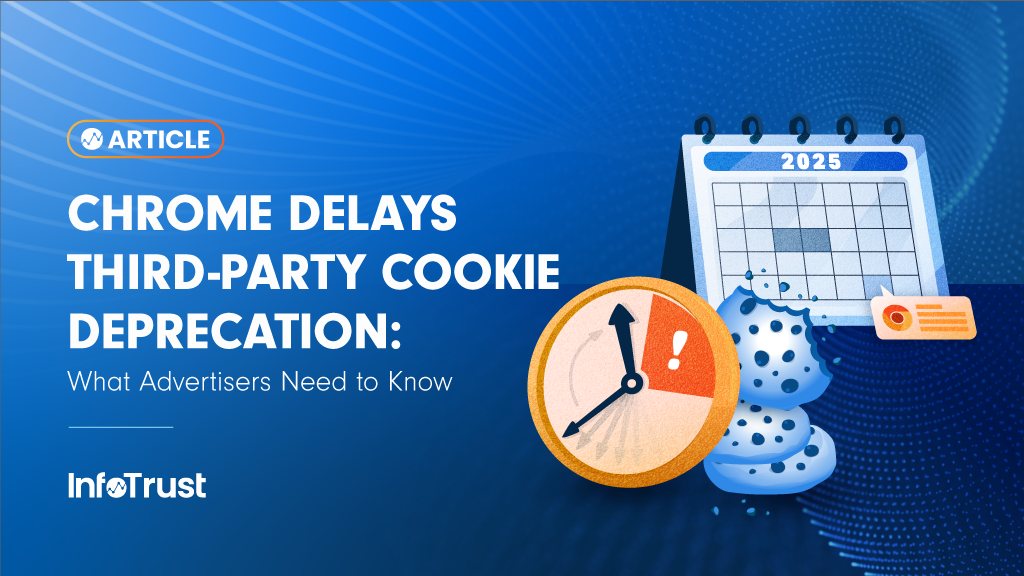Forgive me if you’ve heard this before … Google Chrome is delaying the deprecation of third-party cookies. After the initial timeline of 2020 (We’re doing it!) was pushed back to 2023 (no, really!), further pushed back to 2024 (for real this time, second quarter of 2024!), Google Chrome is NOW targeting early 2025 for the full deprecation to complete.
In the announcement released April 23, Google cites “ongoing challenges related to reconciling divergent feedback from the industry, regulators, and developers.” With industry participants in the current testing phase not submitting their reviews and feedback to the UK Competition and Markets Authority (CMA) until the end of June, it was deemed unfeasible to complete full deprecation in the back half of 2024 as planned. So, what does this mean for advertisers?
What’s happening?
Google Chrome is pushing back their timeline for third-party cookie deprecation from the second half of 2024 to early 2025.
Is early 2025 now a hard date?
As shown by the three prior times, a hard date does not seem to be in the cards. No, the new timeline is not a hard date.
One thing that is important to note, in Chrome’s announcement, they hedge a little by stating “we will not complete third-party cookie deprecation during the second half of Q4.” The plan has always entailed a rolling deprecation from the 1% currently in place for testing to 100% for all browsers. This means that it is still possible that the deprecation roll-out could still begin in 2024.
Why is this happening?
Chrome’s third-party cookie deprecation is dependent upon sign-off from the UK CMA to ensure no competition issues result from the change (i.e. that Google is not preferenced by their browser removing support for third-party cookies). This is the impetus for Chrome’s Privacy Sandbox initiative and various new browser features to ensure the wider advertising technology ecosystem isn’t left out in the cold. These technology providers are currently testing the new Chrome browser APIs and providing feedback to the CMA. Following final review and approval from the CMA, Chrome can begin the full phase out of third-party cookies after a 60-day standstill period (which could be extended to 120 days). Complications in testing and a chorus of concerns raised are extending this broader process and thus requiring delays.
Will third-party cookie deprecation ever happen?
Google maintains that yes, it will. Many in the broader ad tech ecosystem are building out new features and functionality to prepare for the eventual deprecation as well, weaning themselves off third-party cookies in the process. And ultimately, consumers are tired of being tracked across the internet and having their data aggregated by organizations they’ve never heard of. The confluence of these factors points to yes, Chrome will eventually join Safari and deprecate third-party cookies.
What should advertisers do?
Continue to prepare and take advantage of the extended timeline to do so.
For any advertiser that has been working on the testing of “cookieless” solutions in preparation for third-party cookie deprecation, you know that it’s been tough. There have been delays in the availability of the Privacy Sandbox APIs, a longer-than-expected period for ad tech platforms to build out features that support them, and challenges in being able to execute campaigns in fully cookieless environments to reasonably test and set expectations. The additional time should allow for much better solutions to test and prepare for the changes in strategies necessary once results are in.
That’s nice, but can you be more explicit about what advertisers should do?
When working with advertisers, we encourage an iterative testing process beginning with assessing which current media strategies and tactics are most likely to be impacted. The stages look like this:
- Conduct a risk assessment to identify strategies and tactics across media channels that are likely to be impacted. Impacts are likely to be seen in:
- Audience strategy
- Campaign execution
- Measurement and optimization
- Once strategies and their impacts are outlined, identify which are most likely to impact macro goals to prioritize solution exploration and testing.
- Identify what potential options there are to mitigate risks. These could be changes to media strategy, changes in technical architecture, and the onboarding of new technologies and partners.
- Determine ways in which to test and measure the potential options outlined. This includes what to test, how and where to test, and the metrics to measure success.
- Execute tests.
- Review results, make decisions about changes to make and the actions to do so, and repeat the process for additional options and strategies.
Third-party cookie deprecation in Chrome is still in our future—it’s just a little bit further out than initially thought. Advertisers must take advantage of the additional runway to test new solutions and better prepare.



